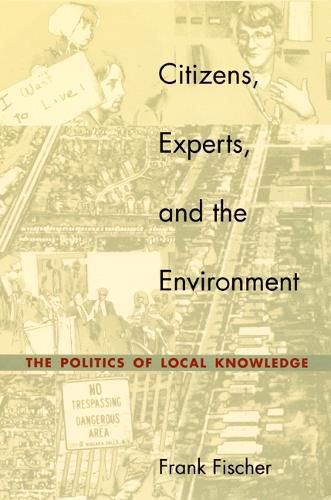Readings Newsletter
Become a Readings Member to make your shopping experience even easier.
Sign in or sign up for free!
You’re not far away from qualifying for FREE standard shipping within Australia
You’ve qualified for FREE standard shipping within Australia
The cart is loading…






The tension between professional expertise and democratic governance has become increasingly significant in Western politics. Environmental politics in particular is a hotbed for citizens who actively challenge the imposition of expert theories that ignore particular local knowledge that can help to relate technical facts to social values. In Citizens, Experts and the Environment Frank Fischer explores this often strained interaction between technical environmental experts and citizen participants and proposes a new model of politics based on participatory inquiry and citizen-expert synergy. Where information ideologues see the modern increase in information as capable of making everyone smarter, others see the emergence of a society divided between those with and those without knowledge. Suggesting realistic strategies to bridge this divide, Fischer calls for meaningful nonexpert involvement in policymaking and show how the deliberations of ordinary citizens can help solve complex social and environmental problems by contributing nontechnical knowledge to the professionals’ expertise. While incorporating theoretical critiques of positivism and methodology, he also offers hard evidence to demonstrate that the ordinary citizen is capable of a great deal more participation than is generally recognized. Recent situations in Copenhagen, Denmark; Woburn, Massachusetts; and Kerala, India, serve as models of the participatory inquiry he proposes, showing how the local knowledge of citizens is invaluable to policy formation. In his conclusion Fischer moves his model from the context of environmental issues to the larger societal issues of deliberative structures and participatory democracy. This study should interest political scientists, public policy practitioners, sociologists, scientists, environmentalists, activists, urban planners and public administrators along with those interested in understanding the relationship between democracy and science in a modern technological society.
$9.00 standard shipping within Australia
FREE standard shipping within Australia for orders over $100.00
Express & International shipping calculated at checkout
The tension between professional expertise and democratic governance has become increasingly significant in Western politics. Environmental politics in particular is a hotbed for citizens who actively challenge the imposition of expert theories that ignore particular local knowledge that can help to relate technical facts to social values. In Citizens, Experts and the Environment Frank Fischer explores this often strained interaction between technical environmental experts and citizen participants and proposes a new model of politics based on participatory inquiry and citizen-expert synergy. Where information ideologues see the modern increase in information as capable of making everyone smarter, others see the emergence of a society divided between those with and those without knowledge. Suggesting realistic strategies to bridge this divide, Fischer calls for meaningful nonexpert involvement in policymaking and show how the deliberations of ordinary citizens can help solve complex social and environmental problems by contributing nontechnical knowledge to the professionals’ expertise. While incorporating theoretical critiques of positivism and methodology, he also offers hard evidence to demonstrate that the ordinary citizen is capable of a great deal more participation than is generally recognized. Recent situations in Copenhagen, Denmark; Woburn, Massachusetts; and Kerala, India, serve as models of the participatory inquiry he proposes, showing how the local knowledge of citizens is invaluable to policy formation. In his conclusion Fischer moves his model from the context of environmental issues to the larger societal issues of deliberative structures and participatory democracy. This study should interest political scientists, public policy practitioners, sociologists, scientists, environmentalists, activists, urban planners and public administrators along with those interested in understanding the relationship between democracy and science in a modern technological society.